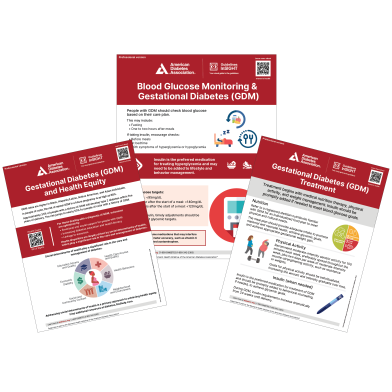Women’s health is crucial to overall health care. Diabetes—whether gestational, type 1, or type 2—poses unique challenges for women at every life stage, making focused care essential. The American Diabetes Association (ADA) is dedicated to advancing women’s health, recognizing the need for specialized study, care, and continuous improvement.
Gestational Diabetes
One of our key areas of women’s health is GDM, which has three main goals:
- Strengthen prenatal GDM screening and referral pathways for pregnant women and at-risk populations.
- Improve postpartum care navigation from specialist to primary care screening and/or treatment for diabetes.
- Empower community health workers, doulas, and promotoras to promote and facilitate prenatal and postpartum screenings and treatment.
The ADA aims to improve health outcomes for women with gestational diabetes (GDM) by adopting equitable, sustainable care models and promoting best practices and education guidelines. GDM is a growing problem in the U.S., especially for people of color. GDM is a major cause of serious maternal, fetal, and neonatal outcomes and may cause women to experience significant health problems later in life.
If GDM is not managed, diabetes can confer significant maternal and fetal risk:
- Unmanaged diabetes in pregnancy can cause risks to both mother and baby.
- GDM is strongly related to race and culture. Rates are higher in Black, Hispanic, Native American, and Asian women than in white women.
- Women with a history of GDM have an increased risk of being diagnosed with diabetes in later pregnancies and an increased risk of developing type 2 diabetes.
- Risk of harmful mother and baby complications continuously increases as a function of maternal glycemia at 24–28 weeks of pregnancy.


